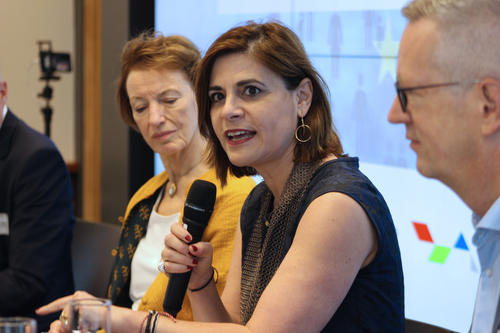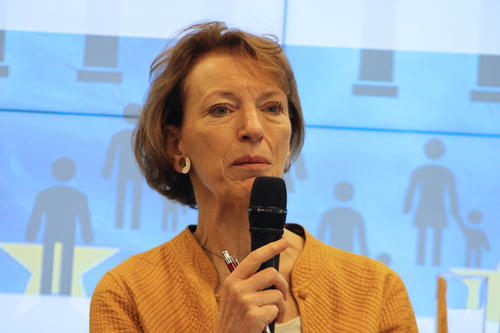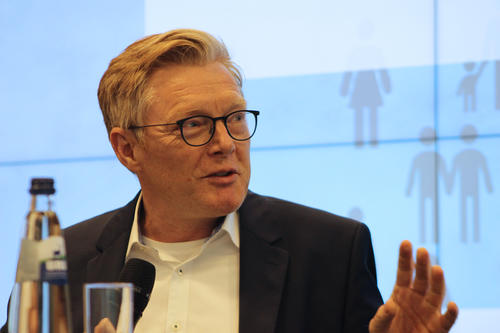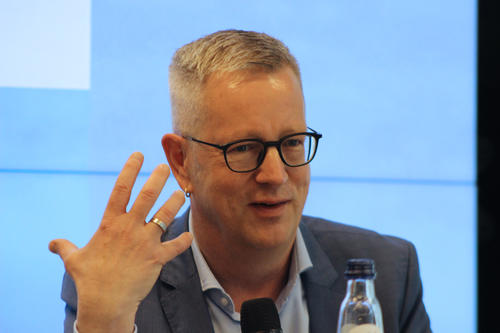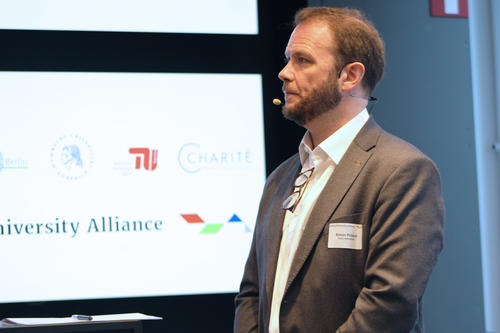Policy Forum I: Stakeholder inclusion – are the European Commission and Universities on the same page?
For a brief insight, we have picked out a few points from the discussion. If your interest is piqued, feel free to watch the recording of the event to dive deeper into the topic.
- Prof. Dr. Maria Leptin, President, European Research Council
- Prof. Dr. Günter M. Ziegler, President of Freie Universität Berlin
- Prof. Dr. Christopher Baum, Chief Translational Research Officer, Charité – Universitätsmedizin Berlin
- Ms. Anna Panagopoulou, Director, ERA & Innovation, European Commission
…it's one thing to have BUA, the Alliance, another thing to demonstrate that Berlin, as a vibrant city, could inspire with the work of BUA…
“…you know, all of you, how challenging has been the debate over the last year about … research assessment and open science…that could be perceived by some people as “a distortion of a well-established market”. It could be perceived as “we change the way that the researchers and the research communities are proceeding in their daily work”. But it could be also perceived as “we are going to bring closer the research community to the business, to the society and to the citizens”.
…the only way we will be able to convince our citizens … is first to be open, transparent, and to be able, to have the skills and the abilities to communicate to them and to make them believe in what we deliver. But even more to engage them when we are doing our research from the very beginning, because we do research, basic research, of course, but we do basic research and research closer to their needs. So the whole narrative has been changed, I believe, at political level….
The Missions is a new way of implementing research where you want to have the citizens engaged from the very beginning.
..of course, I applaud the efforts to engage citizens. Research, and I always speak for fundamental research, is something that is of innate interest to humankind - everybody is curious…and therefore I think people are engaged already even in things that don't do them any good, like a black hole in the universe… What's harder to understand is how science functions, and that's partly where the current disengagement of part of the community comes from.
…we have a success story in medicine, and that is the patient reported outcome measures, PROMs… That is the clear success of patient and stakeholder involvement in research.
I think we should dig deeper with respect to the question of how can we involve society in research assessment. That's clearly a very difficult point, but we can assess researchers based on what they do with respect to involving stakeholders. That's something we can measure objectively - or sort of at least.
… it's even much better if society also has an interest in what's happening there, and for that it needs to be involved…
… we need to get society also involved, and not only that this is important, but also a certain understanding of how this process is… we have to get away from just the results communication, [to] what's the path that the science takes to understanding things.
…society is not one gray block of something abstract, but this is very different fora, this is very different stages, this is different formats, this is different processes, and in that sense, knowledge exchange and societal involvement has to be very diverse to catch also very different parts of society. So it's a very complicated process…
…The part where I'm in the end rather skeptical is …the question how we assess research, this is very difficult, [because] that needs a rather broad and deep understanding...
…indeed, I believe the research assessment, is a way to address many of the issues that we are discussing today and to promote societal engagement. It's extremely challenging, there are a lot of questions to be replied… We cannot legislate on that part, as policymakers, as you know very well…
…we need to ensure flexibility and we need to evaluate and give excellence points to a researcher or to an institution for what they are good at doing…. It doesn't mean that all researchers are good communicators with the citizens….So there are different indicators to evaluate researchers, research organization and institutions. …But what we also want to say is that it cannot be just about the number of publications and which journals…
…”isn't it amazing, within nine months of the pandemic, they got the vaccine”. [But] these mRNA vaccines, they have 30 years of publicly funded fundamental research in there, also, there's major dead ends ... They used years with millions [of €] where in the end they found out a certain thing doesn't work. How do you assess that?... How do you evaluate it?...
…30 years of fundamental research, which in the end then really solved major problems for the world. And that's a story one has to make visible and has to make accessible. and I think there are similar stories, if you look at climate change, tipping points, the mathematics of dynamics and of large networks, and again, for major problems that the world is facing, too….
How do we make this link between institutional commitment to a shared approach and making it meaningful and relevant for individuals?
In the end, it's the institutions who do the hiring, who have to know whom they want to hire on what criteria. And we have to remember universities compete. And if a university decides they're going to stick with the old-fashioned ways that served us, who are among the older cohort here so well, … they may not be able to recruit the young people. Everybody wants the best, everybody wants the most creative, the most intelligent, the most productive. We'll see. Universities will have to adopt a broader way of assessing young people, because a lot of the drive comes from the young people. So I trust that.
…The question is, how do you measure excellence? We have a center …the Quest Center, … and they've just developed a practical tool, a merit app, where applicants … are also being asked other questions: what have they done for reproducibility? Have they ever reported negative results? What is their involvement in other disciplines, so to say, of open science and stakeholder involvement?...
…one observation I learned is the golden rule, which says whoever makes the rules gets the gold. And this is also in researcher assessment: the question what criteria you set there in the end will determine what will come out…. I think it's essential also this question of what are the incentives for research, what are the incentives set for professors, for faculty, for scientists and so on, will in the end determine what happens. And that also is a question on the way to open science, for example…
I know from U.S. universities where senior faculty will discuss their true CV, … the one that not only lists all the prizes and successes, but also lists, what grant applications you have put in that failed. And whatever things you have done in your life that have failed and I think everybody's, also the most brilliant scientist's, CV will get much longer and much more honest and much more interesting.... it's also a question of how do we make these things visible? … how do we report research that did not produce results or only negative results, because this is important for the big picture and for the true picture. And how do we get the true picture in these various assessment questions? That's a question I have.


